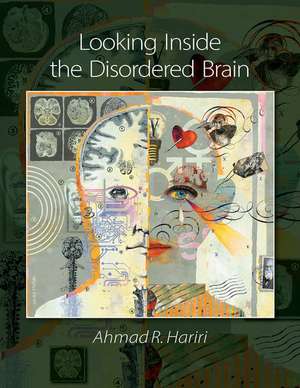Looking Inside the Disordered Brain
Autor Ahmad R. Haririen Limba Engleză Paperback – 12 ian 2015
Preț: 779.91 lei
Preț vechi: 1068.36 lei
-27% Nou
Puncte Express: 1170
Preț estimativ în valută:
149.28€ • 162.21$ • 125.48£
149.28€ • 162.21$ • 125.48£
Carte disponibilă
Livrare economică 31 martie-14 aprilie
Preluare comenzi: 021 569.72.76
Specificații
ISBN-13: 9780878939794
ISBN-10: 0878939792
Pagini: 220
Dimensiuni: 277 x 213 x 15 mm
Greutate: 0.89 kg
Editura: Oxford University Press
Colecția OUP USA
Locul publicării:New York, United States
ISBN-10: 0878939792
Pagini: 220
Dimensiuni: 277 x 213 x 15 mm
Greutate: 0.89 kg
Editura: Oxford University Press
Colecția OUP USA
Locul publicării:New York, United States
Recenzii
Judging by this book, one would expect Ahmad R. Hariri to be an effective and popular teacher. He conveys complex ideas succinctly and clearly in an engagingly informal way, and he integrates old ideas and new information in an approach that is seamless and thought-provoking. Looking Inside the Disordered Brain is an engaging and attractively presented package. The book is highly recommended to students on related courses and well worth a look for those seeking to update their functional neuroanatomy knowledge or to move beyond an introductory understanding of the biological underpinnings of psychopathology." tephen Mullin, PsycCRITIQUES
This text is beautifully organized, very clearly written, and has wonderful graphics. I bet it is bought as much by faculty as it is by students."
This text is beautifully organized, very clearly written, and has wonderful graphics. I bet it is bought as much by faculty as it is by students."
Notă biografică
Ahmad R. Hariri is Professor of Psychology and Neuroscience at Duke University, where he is also Director of the Laboratory of NeuroGenetics. After completing his B.S. and M.S. in evolutionary biology at the University of Maryland, Dr. Hariri completed his doctorate through the UCLA Interdepartmental Ph.D. Program for Neuroscience with Dr. Susan Bookheimer. He next completed a postdoctoral fellowship at the National Institute of Mental Health with Dr. Daniel Weinberger. From 2003-2009, he was first Assistant and then Associate Professor in the Departments of Psychiatry and Psychology at the University of Pittsburgh. In 2009, Dr. Hariri received the Distinguished Scientific Award for Early Career Contribution to Psychology. He was also named a Highly Cited Researcher by Thomson Reuters, identifying him as 1 of only 129 investigators whose research is amongst the top 1% most cited in the field of Neuroscience and Behavior.




